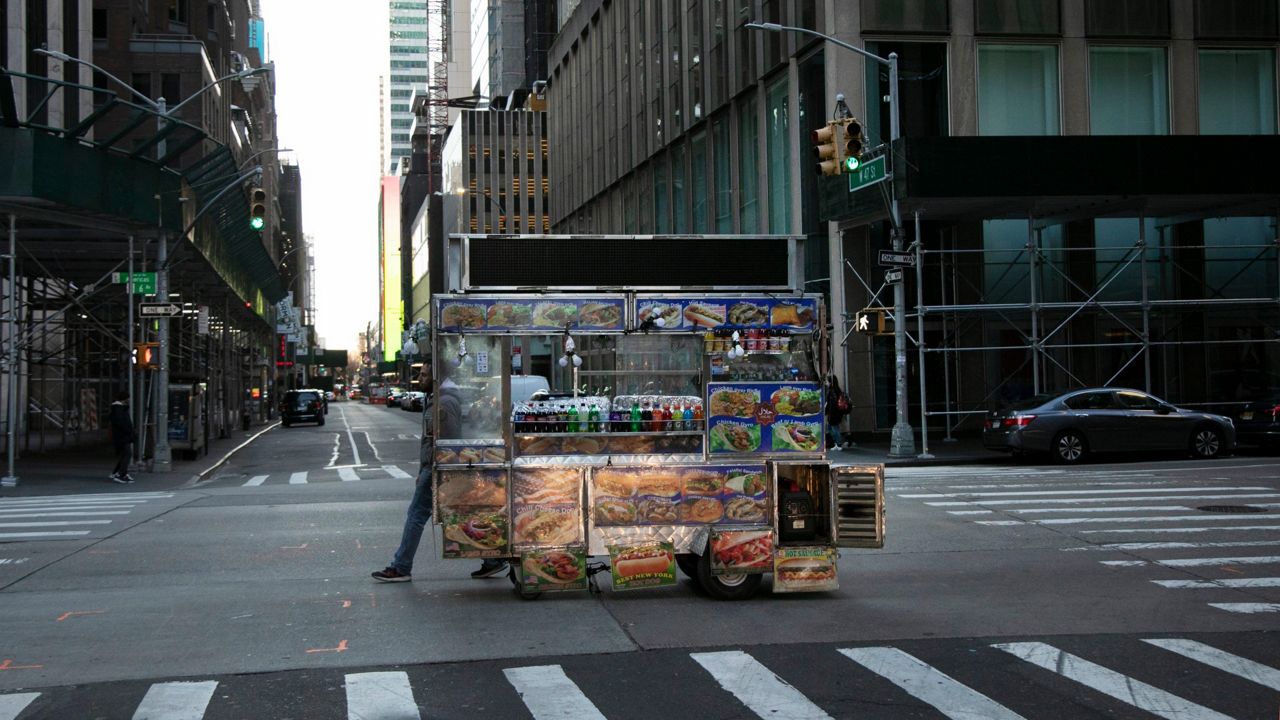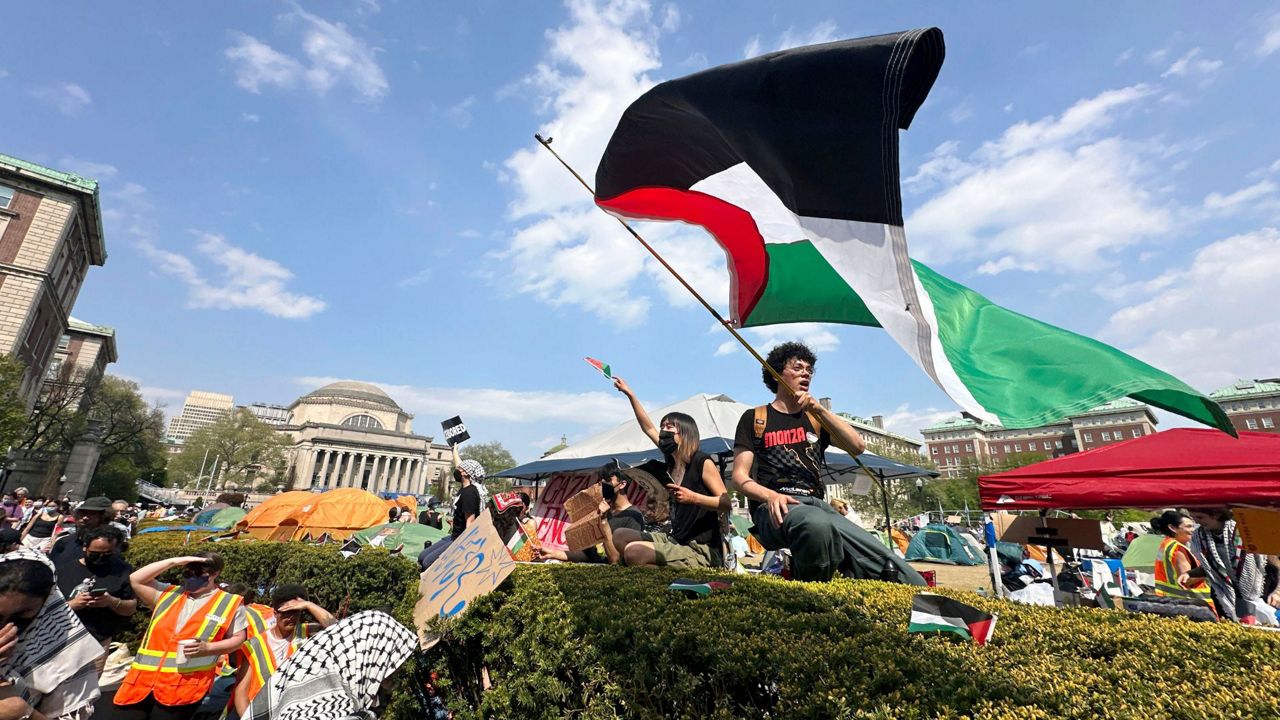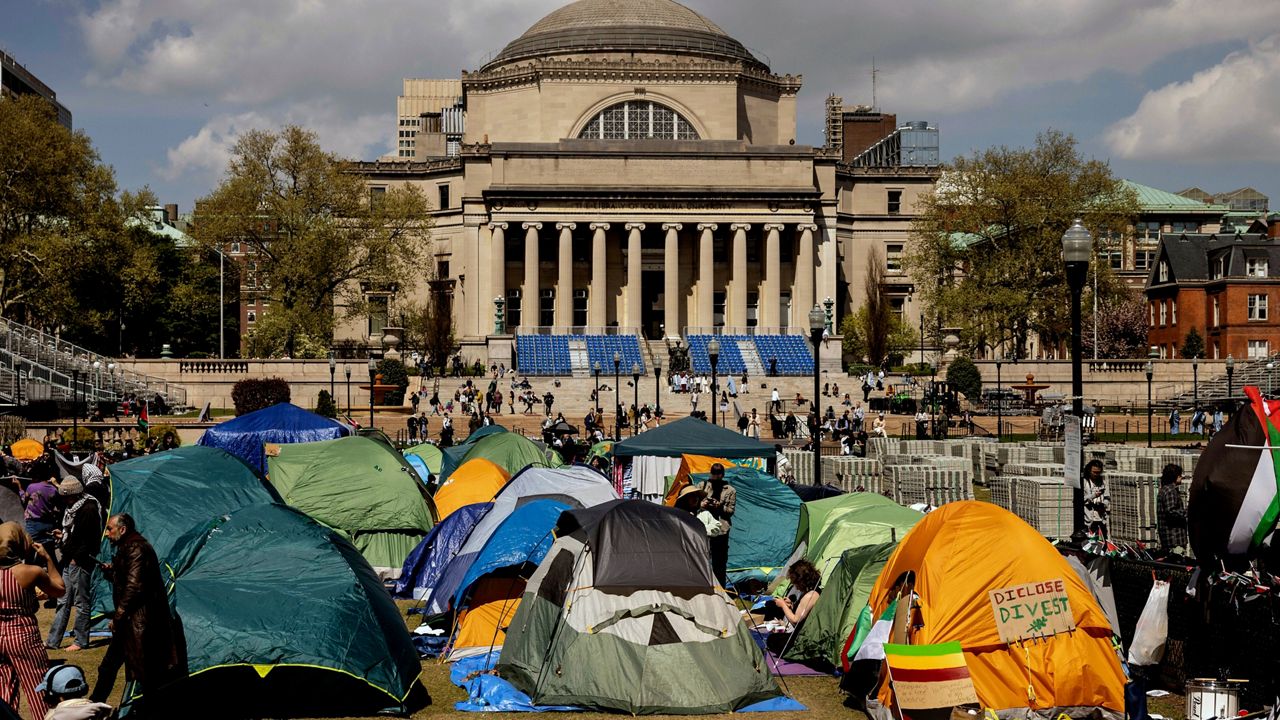The City Council is expected to pass a bill Thursday upending the landscape for the estimated 10,000 to 20,000 street vendors in New York City.
The bill would increase the number of vendors legally allowed to operate on city streets and overhaul enforcement.
The legislation would lift the nearly 40-year cap that has limited the number of permits issued by the city and more than double the amount of street vendors legally allowed to sell food on the street over the course of a decade. By 2032, 4,000 new permits would be issued, which would be in addition to the current 3,000.
The cap hasn’t been raised since it was set in 1983. This scarcity of permits has created an underground market, resulting in some vendors paying tens of thousands of dollars to sell food on the streets.
“It's a very shady market, and it's very illegal,” said Mohamed Attia, executive director of the Street Vendors Project. “And everything is happening under the table.”
To operate as a street vendor, you need a permit for your cart. If you didn’t obtain one years ago, the only way to operate a cart is to rent someone else’s permit.
That’s what MD Alam, originally from Bangladesh, is forced to do. He’s been working as a street vendor since 2005 and said he has to pay $18,000 every two years to the person he subleases a permit from.
“They don't care [about] you,” said Alam, who operates an Indian food cart in Midtown. “They care only we have to pay them and even [during] the coronavirus time, I asked them to get them less money. I don't work [for] seven, eight months. I stay home, no business. [He] said, ‘No, it's not my fault. It's not my problem.’”
According to a 2020 study by WIEGO, a non-profit research organization that advocates for workers in the informal economy, vendors in New York City had the steepest drop in average daily earnings in April 2020 among vendors in nine cities globally. They were also showing the slowest recovery by June and July.
An overwhelming majority of street vendors are immigrants of color, many of whom are undocumented. This creates a vulnerable workforce at risk of fines, confiscation and harassment by the NYPD while they navigate the city’s complex vending regulatory system.
This position of subleasing permits has also made them ineligible for small business assistance like the federal government’s Paycheck Protection Program, which has helped businesses hit hard by the coronavirus pandemic.
The inaccessibility of legal permits puts people at an even higher risk of punitive consequences.
Many people who can’t afford the tens of thousands of dollars required in the underground market decide to take their chances anyway.
“Those people go out every day with a lot of risk,” said Attia. “They can get arrested. They can get a $1,000 ticket and they can get their property confiscated by the enforcement agencies. It's a really bad system.”
In June of last year, Mayor Bill de Blasio announced that he would end the NYPD’s control over vending violations.
The City Council bill takes it a step further and would create an advisory board to review regulations and create its own enforcement office.
“Vendors have been part of New York City history for a very long time,” said the bill’s lead sponsor, Councilwoman Margaret Chin. “They are part of the city’s landscape, and they are part of our economy, so it's about time that we do something to fix this broken system.”
The bill aims to end subleasing permits by requiring that all new permits be issued to a specific person as opposed to a cart. And existing permits must transition over to the new system within 10 years.
But there are vocal opponents to this bill, like Celene Rosada, owner of Sweet Brooklyn Bar in Crown Heights.
“The streets are going to be cluttered even more with nothing but food and food and food outside,” she said. “Nobody's gonna want to go into brick-and-mortars anymore.”
Critics, who are wary about the potential competition of street vendors who have much lower overhead costs, argue their own businesses contribute significantly to the economy.
“The reality of it is that a food vendor can only really employ—maybe five people max per cart or, if you're a super-duper-busy cart, then like six to eight people, max,” Rosada points out. “We employ hundreds of people.”
Street vendors do contribute to the economy, though. According to a 2015 study by the Institute for Justice, street vendors generate an estimated $71.2 million in local, state, and federal taxes, and contribute nearly $293 million to the city’s economy.
The revenues from the new permits would provide an estimated $3.21 million to the city, according to an analysis by the real estate consulting firm HR&A.
Still, the potential loss of sales is concerning for struggling restaurant and bodega owners.
Sandra Jaquez owns two restaurants in Inwood, including a Mexican restaurant that serves tacos. If a taco truck parks itself close to her business, she worries about the impact it’ll have on her establishment.
“If someone comes out right now and they're like, ‘You know what, I just want something to go, let me go to the corner. It's cheaper and I could get the same stuff that I could get at Sandra’s,'" she explained. "'But at the end of the day, I have to pay more just because of the fact that she's a brick-and-mortar location.”
The proposed bill and current regulations do nothing to curb potential competition. There’s only a 20-foot distance rule from a building’s entrance that street vendors must abide by.
There’s also research that suggests vendors intentionally try to avoid setting up their carts in front of businesses selling similar products.
Advocates of the proposed bill maintain that regardless of product similarities, the threat of competition is slim.
“It’s not the same product,” said Attia about street cart food versus brick-and-mortar offerings. “You cannot say that the coffee vendor down the block from my office and their 75-cent cup of coffee is competing with Dunkin' Donuts, who sell a fancy cup of coffee for $3. That's not the same clientele.”
And though many restaurant owners appreciate the difficult situation street vendors find themselves in, they feel that they’re paying the price for the city’s inaction.
“I don't think anybody in the hospitality or the food industry is against somebody wanting to make a living and be able to get a fair way to be given these licenses,” said Rosada. “[But] that program was broken from a long time ago. Why do we have to suffer when the city now wants to step up to fix what they had broke years ago?”
A similar bill was introduced in the City Council back in 2018, although it never came to a vote.
Councilwoman Chin, however, is hopeful this time around.
“A lot of small businesses started out as vendors,” she said. “There are food vendors who were able to open up their own restaurant, so let's see the positive side and really give people opportunity.”
Vendors like Alam hope that a process that will allow him to legally obtain a permit without paying tens of thousands of dollars in the underground economy would change his prospects.
“These money we have, saving this money, you can spend your children education or your future life when you get older,” said Alam. “But now, no choice, we have to stay with the business [because] you need a permit.”





_Pkg_Coney_Island_Racial_Attack_CG)


